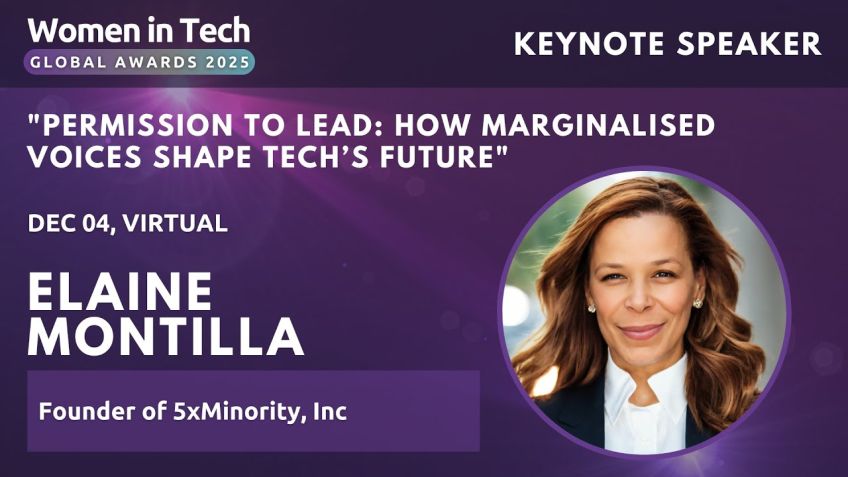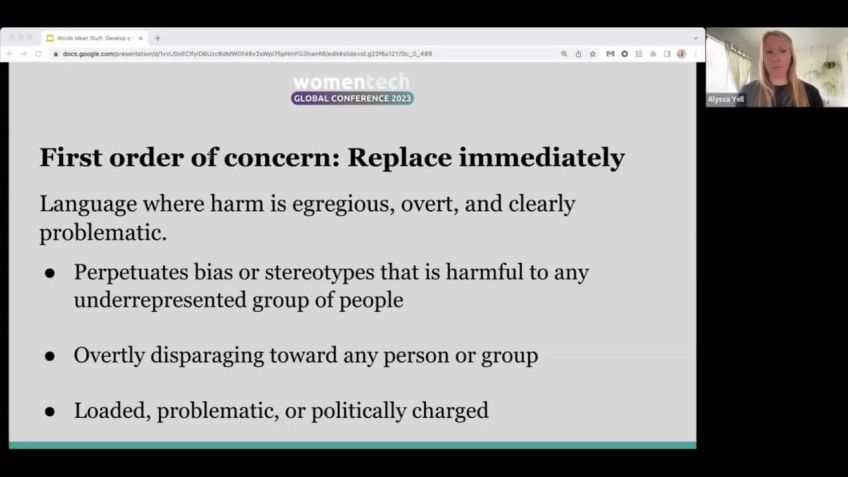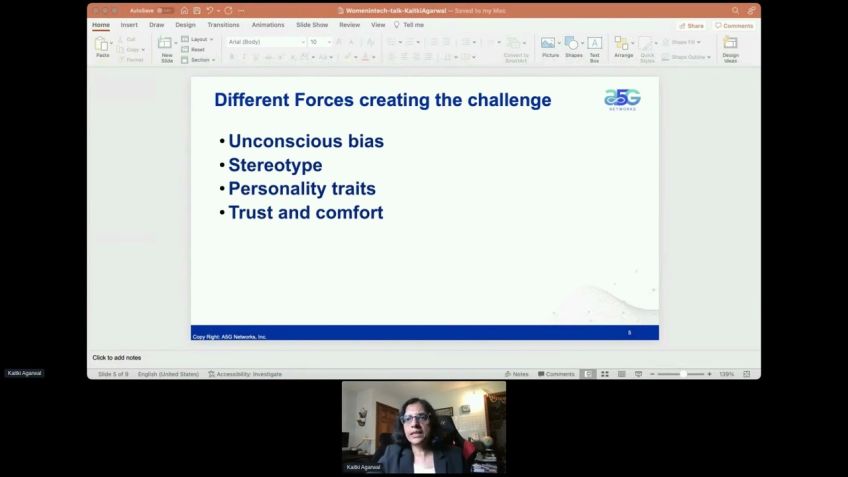Pushing through the unconscious bias
Puja Mittal
Chief Business TechnologistReviews
Fighting Unconscious Bias and Advancing Women in Tech: An Insight with Puja Metal
Hello everyone. I'm Puja Metal, an executive director and chief business technologist for syndicated loan trading and shared services at JP Morgan. With more than two decades of experience in the tech industry, I'm excited to discuss our topic for today - pushing through unconscious biases - and how we can help women advance in the tech ecosystem.
The Presence of Unconscious Bias
Unconscious bias is inescapably prevalent and permeates every aspect of our society. Just last week, I found myself unintentionally presuming that the president of a company was a man, which was a reflection of my own inherent unconscious bias. As we all have unconscious biases, it is crucial for us to discuss and address them.
Have Women Truly Advanced in Today's Society?
According to a study by Enact Education, women have made significant strides in junior and middle management positions, representing almost 50% of the workforce. However, in senior management and C-suite positions, women currently hold only 10% of these roles indicating there's still much work to do.
The Four Tenets for Overcoming Biases and Achieving Success
Let me introduce the four tenets to help guide us towards success:
- Excellence: It's all about being the best at what you do. Acquiring skills and knowledge and delivering quality results are vital elements of this.
- Agency: Define your values and choose your path intentionally. Having aspiring goals and making a plan to achieve them is the essence of this tenet.
- Perseverance: Prepare to face challenges, learn from the mistakes, and bounce back stronger with determination.
- Self Advocacy: Find your support network, speak up for your rights, and ensure you have mentors, sponsors, or coaches who can help you navigate your professional journey.
Breaking into the Industry
In the current industry downturn, it is the skilled professionals who will make headway. Specializations like cloud computing, UI development, and distributed architecture are in high demand as companies are moving toward modernization.
Advice for Recent Graduates
As a recent graduate, building your skills, focusing on internships, volunteering, and taking on self-driven projects are key to gaining valuable experience. Breaking into sectors like data analysis can be done by leveraging these experiences and skills.
Handling Biases
Confronting biases in a professional setting can be challenging, but being firm and confident in your abilities can help. If you find yourself being helped unnecessarily because you're a woman, it's important to express gratitude but also communicate your competence and ability to handle tasks independently.
Hiring Bias: Degree Versus Self-taught
While some companies may show a preference for degree-holders, the trend is shifting toward valuing skills and certifications over formal education. To stand competitive, attaining industry-relevant certificates can prove advantageous.
In a nutshell, unconscious bias is a battle that we must constantly fight. The weapons? Excellence, agency, perseverance, and self-advocacy. By wielding these effectively, we can create an egalitarian environment and secure our tech destiny.
Overcoming Unconscious Biases: An Ongoing Journey
The battle against unconscious bias is ongoing. It requires constant vigilance, action, and self-improvement. By fostering a mindset of excellence, agency, perseverance, and self-advocacy, we can overcome these biases, enhance our career trajectories, and help create an equitable tech industry. Let's take control of our own destiny and keep pushing through unconscious biases.
Video Transcription
Everyone. My name is Puja Metal and I'm really excited to be here today to talk about this very important topic. But pushing through unconscious biases before we start, let me introduce myself.I am uh I work at JP Morgan as an executive director and chief business technologist for syndicated loan trading and shared services. I've been in technology for over 20 years and have worked in various banks in the industry. I'm passionate about diversity, equity and inclusion and helping women in the industry. So let's get started talking about pushing through unconscious biases, unconscious biases is everywhere and there's a lot of effort being done to reduce them. Let me start with the story.
My personal story, I was just talking to a friend uh last week and uh you know, she told me that uh she was going to meet with a friend who has recently been promoted to the president of the company. And I asked, where are you meeting him? She said, oh, it's not a man. It's, it's a woman. And I realized that my unconscious bias had kicked in by just by hearing the word president. I automatically assumed that it's a man. So, unconscious mind is everywhere, even women have unconscious mind. So what can we do about it? That's what we're gonna talk about in the next 15, 20 minutes. Let's look at the climate. Have women truly advanced in today's society. According to a study by enact education, there are still ways to go. We made a lot of progress in the junior and the middle management area where we are representing almost 50% of the workforce, but there's still ways to go for senior Management and C Suite where we are still at 10% of the overall population. So as I was preparing for this talk, I started thinking about different quotes and looking at things and I came across this picture and a quote which I felt was very appropriate for a talk. I was listening, the way to get started is to quit talking and begin doing. We need a paradigm shift. We need to start taking our own destiny in our control. And how do we do that?
There are four tenants of paradigm share one excellence, two agency, third, perseverance and fourth self advocacy. Let's break it down. Number one excellence. Let me tell you a story. So when I started in the workforce, I was one of very few women in the industry. And there will be times I'm the only woman on the floor or I'm the only woman in the meeting or I'm the only woman in the team. I felt I was invisible people will talk over me. I would sometimes not be included in important meetings. Or if I see something, I feel like I'm not being heard. I got very taken down. I would feel like I, I almost felt like I didn't want to do this anymore. And then I got some advice. I went out and did a certification. I really honed in and taught myself the system we were working on and to the point that I would finish my work quickly and then start helping others surely. Very soon I got started getting recognized, started getting called to the meetings. People started asking me how to do things. So really in order to succeed, we have to look for excellence by becoming knowledgeable, getting skills and producing high quality product. Next is agency. So women are really good at working hard and doing things, getting things done.
But what I found is that in order to really get our desired goals, we need to be intentional around it, we need to define our values, figure out what we're passionate about what goals we want to achieve. What's a North Star and create a plan and take action. And when you are defining your goal, make sure that your goal are high, they are higher than what you think it's a North Star and then come up with broken down. What are your short term goals so that you're not intimidated by that high goal. Now, this is kind of basic, but it's important now that you've just written the action plan, he perseverance, prepare to battle, learn from your mistakes, learn from your failures. And there will be that some person who's sitting next to you who might do this, unintended words that might come up as insulting or rejection. How do we take all this and build it into determination so that we can get up and retry every time we fail, every time we make a mistake, we get up and retry. How do we do that? We need to do that by finding our, why? Why is this all important? Why are we doing this? And it may not always shine through? Because when you have so much going on, how does the why shine through? How do you still rise and go forward?
That's when you need self advocacy, you need a support network, someone who is near to you who will remind you why you're doing this. You can do it and help you rise and retry. The second part of self advocacy is speaking up for yourself, staying informed, knowing how to get the information, knowing your rights and responsibilities and finding that person on the floor. Who's gonna be your advocate, your sponsor, your mentor, your coach. So let me tell you a story around this middle of my career. I had some challenges and I hit the bottom of the rock and I feel like I can't move forward anymore. It's really depressed. One good thing I did was I reached out to the people, the senior people on the floor, my peers, even my juniors and I was surprised at the amount of support I got people rallied around me. They told me I'm better than that. I can do it. I got advice, someone even gave me a book that helped me and I was able to get out of it. So really reach out when you need help and take control of your own success. So finally, these are the four things. If we connect, it will help us with a paradigm shift. When we are discouraged. When we are down, we need a mindset shift.
And that starts with us think can do, I can do it, find that support when you need and take the step forward and door to success will surely opened for you. And last but not the least, let's talk about unconscious bias will always be there. We need to get strong and we need to fight for our rights and take action to control our own destiny with excellence, agency, perseverance and self advocacy. Thank you. Let me know if there are any questions. Uh You can type in the chat. Thanks Radika for the question. The question is with current industry downfall. What are your thoughts on the right ways to break into the industry? Atika? I really think that there are a lot of opportunities, especially for people who are skilled. So the right way to get into the industry is find out the area that you're passionate about. There is literally roles in every area you can think of, especially in the cloud area. Uh If you know Java, if you know uh the U I development U I design, um and, and um any kind of distributed architecture, there is a lot of companies are doing modernization and every company realizes that without modernization, they will not be able to move forward. So they're all looking for people who are skilled and can help them modernize. So learn the skills, get, get a cloud certification, do some um and then reach out and I'm sure you will, you'll be able to break into it.
There are lots of rules open for, for skilled people. So really to make, to make way into it, get skilled, would you mind? So next question from Kan is, would you mind giving some advice to recent graduate seeking an entry level data related position in today's job market? Because now most of the jobs are open for senior positions? I think uh I think it's uh there is a little slowdown right now, but I'm positive that this will come back very soon. So I think you have to keep trying and keep applying for jobs and really get scared and be able to nail that interview that a that eventually get. So the it's the same answer which is get skilled, start building some application of your own. So you are able to answer those questions when they come across, do some volunteer work to gain experience. Um You can go on freelancer dot com um or, or do some internships and, and that will help you gain that experience and the skills to be able to find the job. I hope that was helpful. But the data is a data is a very important field. And if you can just gain some experience through internship or self um self projects, I think that that might itself give you that boost to find the new role. Are there other cautions?
I find that people on my team want to help me because I am the only female. How would you handle that? That is such a great question. I think, I think you can be uh you can be honest with them. If you feel that you don't need the help, then you can tell them, hey, I I'll be able to handle it, just smile and say I can do it and I know how to do it. Thank you for your help. So definitely thank them and appreciate their help but be firm and then just do it. So eventually they will see that you can do it. And uh II I think you are lucky that they are helping you. So we should just be appreciative of it. But smile be firm and then show that you can actually do it by doing it. This is very, this is common, this is not actually different experiences. Uh And so it seems like you are in a good team uh where at least people are looking to help, which is a good thing. Uh And, and so, so it's an easier of the two where sometimes people will, will, will ignore you or not want you to do something versus help you. So this is easier one to deal with than the other one. And, and the key is just to be firm.
Any other questions? These, these are some really good questions. Thank you guys. Ok. Um OK, there's one more question from Christine. Do you know about if they are hiring biases towards people with degrees versus self taught? Um I, I would think that there are definitely more, more, um, than biases. It's sometimes it's a policy thing that certain, uh, firms like to hire people with degrees because they feel that by trying to get a degree, you get a certain level of maturity by being in a classroom that make sure that you have been taught the basics of everything, but more and more, uh, now the companies are becoming more flexible.
Uh And, uh, as long as you show that, uh, you, you have experiences with, um with the various advanced topics that the people are looking for. Uh, there, there's openness to hire people who are self taught. Um But in order to kind of show that you have the skills, it's important to have the certifications uh by the accredited sources. So as long as you have those certificates, um I think that um and you show the skills in the interview, uh I think that uh those biases break down very quickly, but sometimes um they could come in during the resume scanning and managers certainly need to be educated about it.
Uh More work needs to be done in this area. OK. We are at time so we'll stop here. Uh Thank you everyone for joining uh and uh really appreciate all the questions. Thank you. Bye.







No comments so far – be the first to share your thoughts!